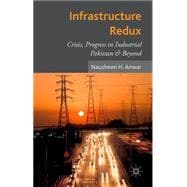Pakistan's economy is currently semi-industrialized, but it has the high potential for prosperity in the 21st century. The focus of this book is on industrial infrastructures of production and circulation, from power generation and distribution to roads and ports. It looks at how these material technologies underpin visions of progress and mediate relations between the state and capitalist firms in export-oriented industrial and industrializing districts in Punjab, Pakistan. In this book infrastructure is understood as a material technology intimately tied to the shaping of modern-industrial society and as a sociotechnical system linked to the specific project of Pakistan's economic development.
Like most postcolonial nation-states, the Pakistani state planned, provided and owned infrastructure, which in the aftermath of independence in 1947 was tied to a mode of rule while promising rapid material progress. But today the state is perceived as having failed to provide infrastructure and is disconnected from local-industrial contexts or superseded by the whims of powerful politicians. For industrialists, infrastructure's disruptions are perceived and experienced in two ways: first as literal technological collapse that carries high costs, breakdowns and immobility; and second as the loss of a moral order due to political interference.
The author argues that in the present conjuncture of an infrastructure crisis, the apparent absence of the state in the planning and provision of industrial infrastructure is somewhat deceptive. Although the state is not absent, its presence is reconfigured through a variety of firm-led initiatives to repair and rebuild infrastructures. Folded into patron-client frames, the ensuing state-firm relational engagements for building infrastructure reinvigorate the promise of progress. Furthermore, the strategies of capitalist firms operate within a moral economy in which a pervasive narrative of national moral decline and uncertainty explains the disintegration of a specific type of public infrastructure: electricity.
Straddling the disciplines of development economics, history and anthropology, this study will appeal to students, scholars and researchers interested in industrialization and globalization.
Like most postcolonial nation-states, the Pakistani state planned, provided and owned infrastructure, which in the aftermath of independence in 1947 was tied to a mode of rule while promising rapid material progress. But today the state is perceived as having failed to provide infrastructure and is disconnected from local-industrial contexts or superseded by the whims of powerful politicians. For industrialists, infrastructure's disruptions are perceived and experienced in two ways: first as literal technological collapse that carries high costs, breakdowns and immobility; and second as the loss of a moral order due to political interference.
The author argues that in the present conjuncture of an infrastructure crisis, the apparent absence of the state in the planning and provision of industrial infrastructure is somewhat deceptive. Although the state is not absent, its presence is reconfigured through a variety of firm-led initiatives to repair and rebuild infrastructures. Folded into patron-client frames, the ensuing state-firm relational engagements for building infrastructure reinvigorate the promise of progress. Furthermore, the strategies of capitalist firms operate within a moral economy in which a pervasive narrative of national moral decline and uncertainty explains the disintegration of a specific type of public infrastructure: electricity.
Straddling the disciplines of development economics, history and anthropology, this study will appeal to students, scholars and researchers interested in industrialization and globalization.








